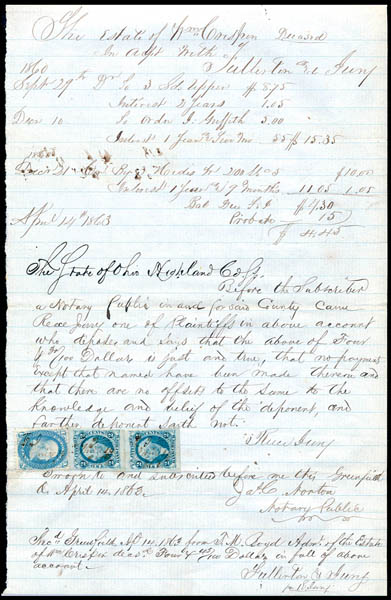
Lot 888
1861, 1¢ blue, used with two Bank Check 2¢ blue (R5a) singles, each with manuscript "R.I., April 14, 1862" (wrong year) cancel paid the 5¢ tax on an 1863 General Certificate involving the settlement of an estate, although it is not a probate document, manuscript notary public certification at bottom; 1¢ with fold crease, Very Fine, ex-Morrissey.Scott No. 63 Estimate $150 - 200.
The Revenue Stamp Tax Act of 7/1/1862, effective 10/1/1862 required that almost all legal and commercial documents, as well as some other items (e.g., playing cards, photographs), be taxed. Revenue stamps were to be affixed to show payment of the tax. There was a strong incentive to pay the tax because contracts, promissory notes, and such were not considered legal documents without the stamps. Until 12/25/1862, the law stated that a particular type of document, like a bank check, could only bear a revenue stamp with the particular article, Bank Check printed on its face. After that date, revenue stamps could be used on any type of document, except for the Proprietary stamp.
Postage stamps were never valid (legal) to pay revenue tax, or vice versa, because the money went to two different Federal departments for distinctly different purposes. Nonetheless, due to the unavailability or revenue stamps or other reasons, postage stamps, particularly the 1861 Series, were often used, and were generally accepted as proof that there was no attempt to avoid payment of the tax.
Realized: $140

Lot 889
1861, 1¢ blue, horizontal pair, used with 3¢ rose (65), tied together by manuscript on Nov. 11th 1863 sworn statement prepaying the 5¢ tax for a general certificate, embossed "Alexr Long Notarial Seal, Hamilton Co." seal, stamps were canceled with pen strokes instead of the proper date and initials, Very Fine.Scott No. 63 Estimate $150 - 200.
Realized: $140

Lot 890
1861, 1¢ blue, dark shade, manuscript "Dec 19 1863 DES" on 1863 $100 Bill of Inland Exchange promissory note to be paid the next day, proper 1¢ rate for under $200 and less than 30 days, Very Fine and scarce rate, ex-Morrissey.Scott No. 63 Estimate $100 - 150.
Realized: $180

Lot
891 
1861, 1¢ blue, vertical pair, used with 3¢ rose (65), all cancelled by manuscript "RMG, Feb 13. 64" on 1864 complaint for divorce and sworn statement, prepaid 5¢ tax for sworn general certificate, inside is a court docketing notation dated Feb. 29th 1864; couple small stamp flaws, Very Fine. Scott No. 63 Estimate $100 - 150.
The tax rate for the divorce complaint was 50¢. It is not known if this was previously paid and this was a refiling with the notary sworn statement, or there was ignorance about the proper tax rate.
